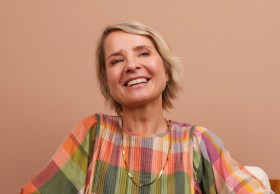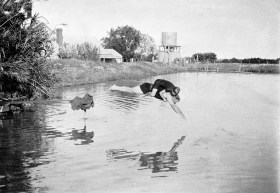‘Don’t get old,’ my Grandma once advised me. I nodded in futile agreement, wondering what the alternative was, and what age was ‘old’ anyway?
Jacinta Parsons is not old old. She’s somewhere in the cusp of mid-life, peri-menopausal, a woman who’s stopped getting catcalls on the street. ‘I am only at the early stages of what ageing will mean to me,’ she writes.
More than a memoir about ageing, this is very specifically and politically about ageing as a woman. It’s about being objectified your whole life, then all of a sudden becoming invisible and wondering where all the rage comes from. Parsons recounts her internal grappling with the midlife ‘creep’, how realisations of her changing form and place in society are setting in, and that the middle is ‘always the worst place’.
Parsons uses Odyssean descriptions of elements – fire, wind and water – to describe the experience of being a woman. She reaches for mythological archetypes like ‘the witch’, ‘the mother’ and ‘the slut’ to demonstrate how women have been placed in boxes their whole lives, subjected to ‘street harassment’ and told to comply with societal expectations.
The first few chapters cover ‘the maiden’, becoming a mother and being a woman who ‘challenges the power elite’ and will be ‘destroyed like the women before them’. She weaves memoir in with statistics and anecdotes to bolster her thoughts.
The thing is, Parsons uses the imagery of ‘the woman’ universally but it seems the kind of ageing she’s describing is anything but universal. It’s a deeply Western version, shaped by culture more than anything else.
She touches on this briefly, acknowledging that ‘the experience of ageing can be largely cultural’ and ‘ageing happens to us both as a reality of biology and a construct of culture’. She even states, in the beginning, her limited perspective as a white cis-gendered woman.
But the picture she paints is of a deeply dysfunctional society in which women are victims of the patriarchy, internalised misogyny and a hyper-sexualised culture, which may be true, but it’s difficult to believe it’s a universal experience. Surely women in other cultures age with more dignity, without all this internal grappling? I started to wonder whether it’s all the internal grappling which makes us all so miserable about the idea of ageing.
One of the later chapters is a meditation on death, and perhaps the strongest. It seems the realities of ageing are finally realised in Parsons’ coming to terms with her own ultimate conclusion. She watches an apple core succumb to decay and waxes lyrical about her relationship with time. There’s comfort, she writes, in knowing you’ll return to the earth to nourish another; that letting go takes ‘utter courage’.
Read: Book review: This Devastating Fever, Sophie Cunningham
While there are beautiful passages of imagery that are sure to find an audience with fans of Parsons’ previous work, A Question of Age feels like an extended blog post with no ground-breaking revelations.
Shortly after, I picked up Lily Brett’s memoir, Old Seems to be Other People, in which she recounts among other things, being assisted in an Apple store by two zealously benevolent employees who use the ‘tone of voice you would use if you were speaking to a three-year-old’.
I found this vignette, with its kernels of insight into what it actually looks like to be ageing in modern, Western society, more truthful.
A Question of Age: Women, ageing and the forever self, Jacinta Parsons
Publisher: HarperCollins
ISBN: 9780733342165
Format: Paperback
Pages: 304pp
RRP: $34.99
Publication Date: 7 September 2022





